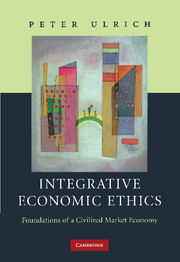Book contents
- Frontmatter
- Contents
- List of figures
- Preface
- Translator's note
- Introduction: orientation in economic-ethical thinking
- Part I Fundamental concepts of modern ethics and the approach of integrative economic ethics
- Part II Reflections on the foundations of economic ethics I: a critique of economism
- Part III Reflections on the foundations of economic ethics II: rational economic activity and the lifeworld
- Part IV A topology of economic ethics: the ‘sites’ of morality in economic life
- Bibliography
- Index of subjects
- Index of names
Introduction: orientation in economic-ethical thinking
Published online by Cambridge University Press: 22 September 2009
- Frontmatter
- Contents
- List of figures
- Preface
- Translator's note
- Introduction: orientation in economic-ethical thinking
- Part I Fundamental concepts of modern ethics and the approach of integrative economic ethics
- Part II Reflections on the foundations of economic ethics I: a critique of economism
- Part III Reflections on the foundations of economic ethics II: rational economic activity and the lifeworld
- Part IV A topology of economic ethics: the ‘sites’ of morality in economic life
- Bibliography
- Index of subjects
- Index of names
Summary
It has often been said that man must stand at the centre of the economy. This statement is certainly correct, but it is now necessary to make this general dictum more precise.
Economic activity based on division of labour is a societal process designed to satisfy the human need to preserve and sustain the quality of life. It seems to lie in the nature of things that a rational social form of economic activity must be oriented towards the service of life if it is to be meaningful. Consequently, in the words of Alfred Müller-Armack, man must indeed have a central place in the inherent logic of the economic system.
All well and good! In the practice and the theory of the modern market economy, however, we more and more frequently encounter what is called the inherent logic of the economy as a strangely anonymous and coercive logic. It occasionally contradicts our intuitions and governing ideas about the good life and just ways of living together in a well-ordered society of free and equal citizens. This logic condemns some people to unemployment and subjects others who are still on the labour market to increasingly hard pressure to perform at work. In this way it incessantly improves ‘productivity’ or what we regard as productivity, yet it still fails to provide everyone with what is minimally necessary for a life worthy of a human being at a national, let alone at a global, level.
- Type
- Chapter
- Information
- Integrative Economic EthicsFoundations of a Civilized Market Economy, pp. 1 - 10Publisher: Cambridge University PressPrint publication year: 2008

